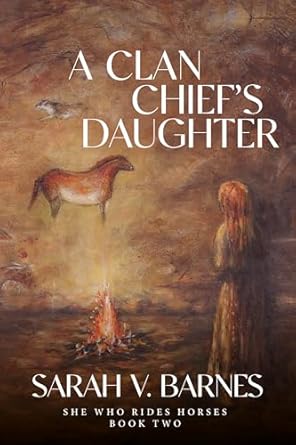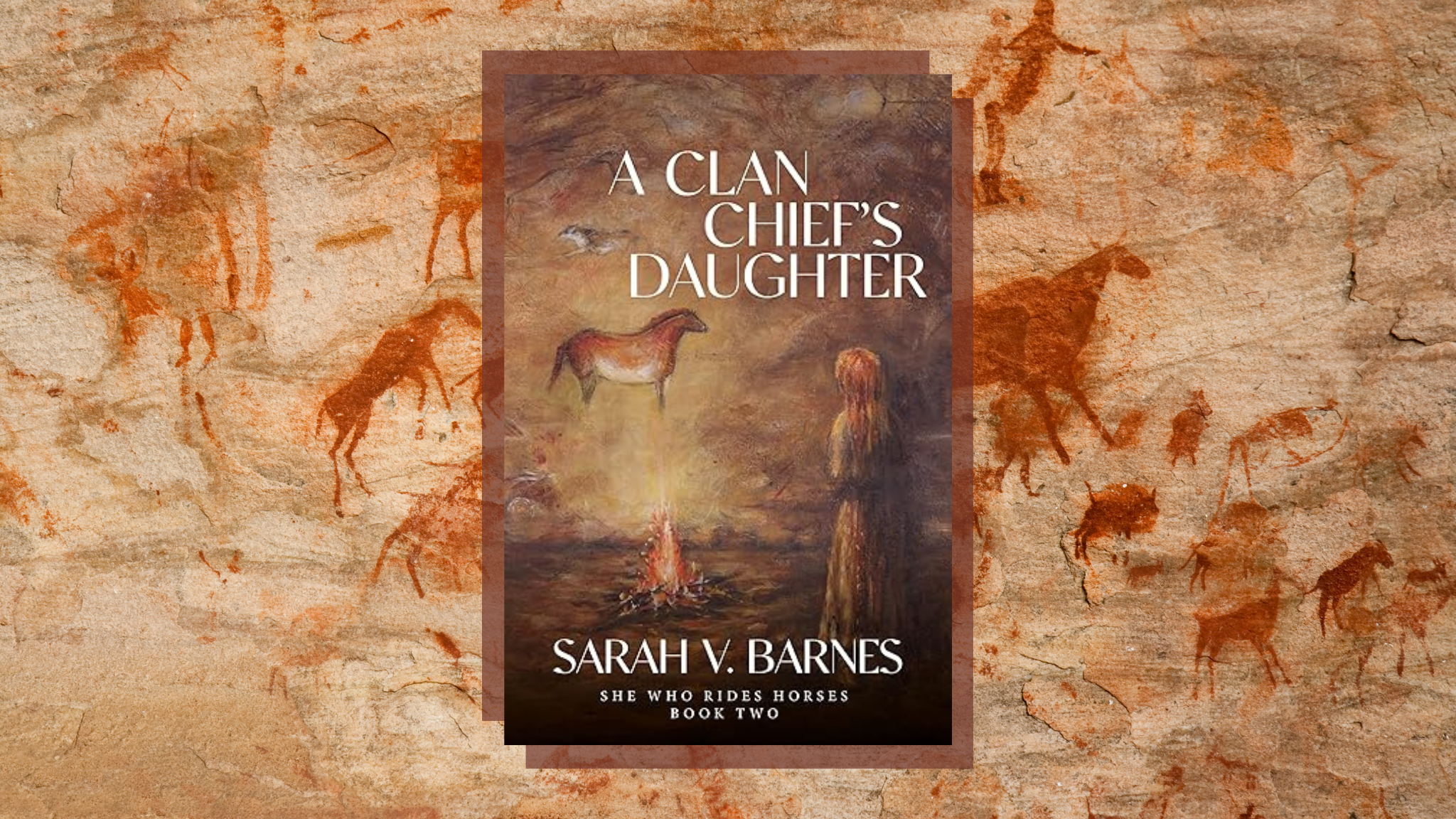A Clan Chief’s Daughter: She Who Rides Horses (Book Two) by Sarah V. Barnes
Some books immerse you so completely in their world that you look up hours later, dazed, as if waking from another life.
A Clan Chief’s Daughter is one of those rare stories — a lyrical, emotionally layered journey through prehistoric steppes where survival hinges on family, spirit and the wild magic of horses.
In this second installment of the She Who Rides Horses series, Sarah V. Barnes continues the tale of Naya, a girl of 15 summers whose bond with a red filly in Book One changed everything. Now, the stakes have grown — not only for Naya but for the future of her entire clan. Her grandfather, the former chief, has passed on, and with him goes the delicate balance of tribal power. As her father Potis steps into leadership, he finds himself immediately tested by famine, betrayal and internal dissent. Meanwhile, Naya returns home from a winter of hardship and spiritual awakening to discover her people on the edge of collapse — and the herd of horses she once called her own, captured and penned like livestock.
Modern Story in Ancient Times
Set around 4000 BCE on the Pontic-Caspian steppe, Barnes creates a historical tapestry that feels both meticulous and intuitive. We don’t just read about life in a Bronze Age clan — we feel the crunch of snow under worn leather boots, hear the murmur of stories shared over firelight, and smell the earthy smoke that clings to hide garments. This isn’t just a setting; it’s a living ecosystem of belief, conflict and transformation. The author threads through Proto-Indo-European mythologies and languages so effortlessly that readers might not even notice they’re absorbing an ancient worldview until they’re deep in its current.
And yet, for all its historical depth, what makes A Clan Chief’s Daughter resonate is its modern emotional core. Naya is a strikingly real protagonist — fierce, headstrong, often uncertain and always seeking the truth, even when it hurts. Her journey isn’t just one of external challenges (though there are plenty) but of internal reckoning. She’s caught between roles: daughter and potential wife, spiritual visionary and reluctant figurehead, wild rider and dutiful clan member. It’s this tension — the pull between personal calling and social expectation — that gives the novel its heartbeat.
That tension is mirrored beautifully in her relationship with the horses, which are more than symbols in Barnes’ telling. They’re agents of change, spiritual messengers, and beloved companions. In the hands of a lesser writer, the horse motif might feel overplayed, but here it’s handled with such reverence and nuance that it never loses its power. Whether it’s Naya listening for the distant call of her red filly or mourning the loss of a young colt, the presence of these creatures grounds the novel in something both mythic and deeply personal. They are freedom embodied — and they are under threat.
Complex and Dynamic Characters
Indeed, threats abound, and not all come from outside. One of the most compelling aspects of the novel is how it portrays leadership, not as a fixed trait but as a series of hard choices made in impossible situations. Potis, Naya’s father, is a man doing his best in a world where every decision carries weight. Should he retaliate after a devastating raid or wait for tribal consensus at the sacred Gathering? Should he prioritize tradition or risk something new? His dilemmas are rendered with compassion, even when his choices conflict with Naya’s desires.
And then there’s Wailos — charismatic, calculating and possibly the most dangerous person in the story. When he proposes capturing wild horses for ritual sacrifice, it seems like a solution to the clan’s problems. But for Naya, it’s a betrayal of everything the horses represent. Barnes excels at this kind of layered conflict. No one here is purely good or evil; rather, they operate under different truths, shaped by culture, fear and survival. That realism makes the story hit harder, especially as Naya begins to see how much influence she may wield — and what it might cost her.
Historical Fiction with Heart
The supporting cast is equally rich. From Naya’s sharp-eyed grandmother Awija to her conflicted mother Sata, from rival youths with old grudges to unexpected allies from foreign tribes, each character brings complexity and weight to the narrative. Even the characters who appear only briefly feel textured and real, each contributing to the broader tapestry of tribal life. This is a world where gossip travels as fast as horses, where a glance can seal a marriage deal, and where a whisper of prophecy can shape destiny.
And yet, there are quieter moments, too — moments where the prose lingers on a gesture, a breath, a memory. Barnes writes with elegance and restraint, allowing emotion to build slowly until it breaks over the reader like a wave. The grief in this novel — whether for a lost ancestor, a shattered trust or a slain animal — is never melodramatic. It’s raw and human and achingly familiar.
That emotional honesty is perhaps the book’s greatest strength. Even as the story unfolds against an epic backdrop of tribal politics, interclan rivalries and spiritual reckonings, it never loses sight of its beating heart: a girl trying to do right by those she loves, even when the path is anything but clear.
A Poetic and Powerful Read
A Clan Chief’s Daughter stands confidently on its own, but for readers who followed Naya’s journey in the first book, the emotional payoff is even greater. This sequel deepens everything: the stakes, the relationships, the mythology. It’s not merely a continuation; it’s an evolution — both for the characters and the world they inhabit.
By the end, it’s clear that something profound has shifted. The clan may still be fragile, their future uncertain, but thanks to Naya — to her choices, her courage, her heartbreak and hope — they have a new story to tell. One not dictated by fear or tradition alone, but by a vision of what could be, if they dare to imagine it.
Readers of historical fiction, fans of spirited heroines, horse lovers, and anyone who has ever felt torn between belonging and becoming — this book is for you. Poetic, powerful and deeply humane, A Clan Chief’s Daughter is a reminder that sometimes, it takes just one person — one rider, one dreamer, one daughter — to change the course of history.
 Sarah V. Barnes is both an historian and a horsewoman. When she is not writing stories, she practices and teaches riding as a meditative art. She also offers equine-facilitated coaching and wellness workshops. Sarah holds a Ph.D. in history from Northwestern University and spent many years as a college professor before turning full-time to riding and writing. She as two grown daughters and lives with her husband, dogs and horses near Boulder, CO.
Sarah V. Barnes is both an historian and a horsewoman. When she is not writing stories, she practices and teaches riding as a meditative art. She also offers equine-facilitated coaching and wellness workshops. Sarah holds a Ph.D. in history from Northwestern University and spent many years as a college professor before turning full-time to riding and writing. She as two grown daughters and lives with her husband, dogs and horses near Boulder, CO.

Publish Date: 6/21/2025
Genre: Fiction, Historical Fiction
Author: Sarah V. Barnes
Page Count: 442 pages
Publisher: Heart Soul Horse Publications
ISBN: 9798992769012

